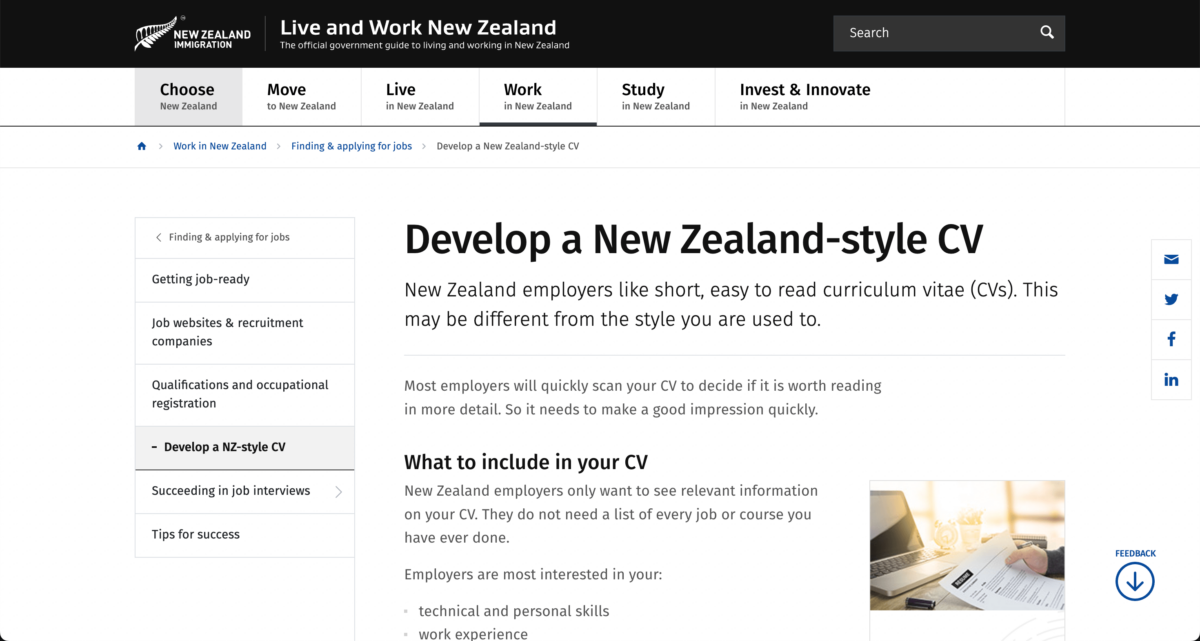Who Am I Writing My CV For?
When you sit down to write your CV it’s crucial that you remember who you’re writing it for. Your CV is essentially an advertisement of yourself as a potential employee; the most important thing in advertising is to “know your audience” and, in this instance, your audience is the recruiting manager.
Typically a recruiting manager spends about 6-8 seconds with your CV in their hand before deciding whether to add it to their shortlist. As about 80% of the CVs they look at do not make the cut, it is essential that your CV makes a good first impression.

First Impressions Matter With CV Writing
Now you understand your target audience, your next job is to impress them. A recruiting agent receives hundreds of CVs on a given day, and yours is just one among many. This can be an intimidating thought, but there is actually a pretty straightforward formula that will set you apart from the crowd. This consists of fine-tuning the main features of your CV which include:
- Layout.
- Informational hierarchy.
- ATS Optimisation.
These are just 3 examples of a much larger list. Unfortunately, learning how to master CV writing isn’t a subject taught in school. You must actively seek out information on how to write a CV that meets a recruiters standards.
This exposes you to a lot of conflicting advice. You’ll find a tonne of templates that all claim to be the ‘best’, and many so-called experts touting their unique ‘secrets to success’. That’s not to say that some of these resources can’t be valuable, but sorting it all out can be overwhelming. Fortunately, New Zealand recruiters have standards that they refer to when assessing CVs. By understanding NZ standards you give yourself a marked advantage when you’re constructing your CV.

What Are The New Zealand Standards For CV Writing?
The ‘New Zealand standards’ for CV writing refer to:
The preferences and expectations set by New Zealand employers over time.
They are not strict rules, but rather guidelines that have been established through consistent feedback from recruiters. These standards stress the importance of brevity, relevance, and clear evidence of how you’ve applied your skills.
NZ standards are especially important to consider if you’re coming from outside of New Zealand. When it comes to employment, recruiters in other countries will have different expectations for their candidates. These expectations are influenced by things such as cultural norms, industry practices, regulatory requirements, and local business etiquette.
For example, in New Zealand, it is common to include a brief personal statement at the start of your CV, providing a snapshot of your skills, experiences, and career goals. However, including personal details such as marital status, age, or a photo — common in some countries — is not expected or encouraged in New Zealand due to strict privacy and discrimination laws.
If you would like to know more about this, then there is some great information on the NZ Immigration website.

It Is Important To Consider NZ Standards When Writing Your CV
Putting this into practice, when you sit down to write your CV, it is important that you keep New Zealand standards in mind. This can be tricky as NZ standards have never been set in stone or compiled into a definitive list. However, we have provided you with a great starting point by putting together the following list. Remember, each one of the items below are important and if you can find a way to include all of them, then you will be well on your way to writing an excellent CV.
Key Guidelines For a NZ Standard CV
- Concise – Your CV shouldn’t be any longer than two pages. If your CV is too long it is far less likely to be reviewed by the recruiter. Two pages is ideal as it allows you to provide all the relevant information, while still being concise.
- Easy to read – A CV that’s easy to read is well laid out, free from excessive jargon and uses good grammar/punctuation. Remember, your CV can be full of impressive content, but if it’s hard to read, it runs the risk of being passed over. Incorporating a good amount of white space is also highly recommended for readability.
- Impactful – This relates to making a positive first impression. Your CV needs to be pleasing to the eye at first glance. If your CV is just a massive block of text, that can be off-putting for the person who has to read it. Remember, the recruiting manager is only human, and humans like things that look good.
Essential Elements of a Well Constructed CV
- A personal statement – A brief introduction about yourself, your career goals, and why you’re suited for the role.
- Technical / hard skills – These are specific abilities obtained through learning or practice, such as proficiency in a particular software, tool, or technique related to your field.
- Soft skills – These are less tangible abilities more closely related to your personality traits such as communication, problem-solving, leadership, and adaptability.
- Key Competencies – A more detail overview of your main skills. These highlight some of your strongest skills and how you have best put them to use in your previous roles. These should also be relevant to the role you are applying for.
- Work experience – This encompasses your past employment, including the roles you’ve held, your responsibilities in those roles, and achievements or progress made during your time in each role. These should be listed in chronological order.
- Qualifications – Any recognitions or certifications granted by a tertiary educational institution, or industry-specific authority.
- Education – This refers to your formal schooling history, including high school, vocational training, undergraduate, postgraduate degrees, and any other relevant courses or study you’ve undertaken.
- Community and volunteer experience – Any unpaid work you’ve done for the benefit of your community or a specific cause. This can include roles in local clubs, charities, events, or service organisations.
- Achievements – Examples of a when you have excelled in a particular role. These can include; promotions, awards, projects and sometimes instances you have been praised for in a role. If possible, it is a bonus if you can quantify your achievements with figures, percentages or statistics.
However, ensuring that your CV aligns with New Zealand’s standards is only one element of the successful job application journey. Applicant Tracking Systems, or ATS, has become a significant factor that you must consider when writing your CV.

What Is ATS?
Automated Tracking Systems are computer software programs that automatically sort CVs that get submitted digitally. They are an indispensable tool for modern recruiters and human resource professionals. An ATS will sort CV’s based on a variety of criteria such as keywords, skills, years of experience, and even educational background. These systems allow companies to handle large volumes of applications efficiently, streamlining the recruitment process. However, this also means that many CVs are discarded or overlooked due to incompatible formatting or lack of specific keywords.
To pass through these systems successfully, it is recommended that you avoid excessive formatting, like images, tables, or unusual fonts, as these can be misread or entirely ignored by the ATS. Instead, use standard formatting options like bullet points and common fonts, ensuring the text is easily readable for both ATS and human recruiters. With these tips, you can significantly increase the chance of your CV passing the ATS and landing on the hiring manager’s desk.
Crafting an Effective CV
It’s easy to see why it is said that: “Your CV is the most important document you own”. It can mean the difference between getting the job you want, and not even being considered as a candidate.
However, even for individuals with exceptional writing skills, crafting a CV can be a daunting task. It’s not always easy to effectively market yourself, and lacking an external viewpoint can leave you wondering if you’re on the right track. If you’re feeling uncertain, employing the services of a professional CV writer could be a valuable solution to this problem.
Hiring a Professional CV writer
When it all seems a bit much, reaching out to a professional can be the best answer. Having a professional CV writer craft the perfect CV takes a lot of the uncertainty out of the process. They have spent the time necessary to understand all of the factors mentioned above, and many more. A professional CV writer can expertly tailor for each individual, ensuring that you get the very best CV, every time.
The amount of CVs a professional CV writer has produced can number in the thousands. This means that they’ve honed their skills in various industries in a way that no individual job seeker ever could. Just like if you wanted the perfect suit, you’d hire an expert tailor. When it comes to a CV, your most important document, an expert CV writer can be your secret weapon.
Where Can I Find a CV Writer in NZ?
Numerous choices are available to you when deciding to employ a professional CV writer. The primary factors to consider include price, reputation, and customer service quality.
At Smart Write, we’ve been providing our services to customers since 2017, demonstrating a solid history of impeccably crafted CVs. We’re deeply committed to excellence and outstanding customer service. Furthermore, we firmly believe that a professionally written CV shouldn’t substantially strain your budget. We also specialise in transforming international CVs to meet NZ standards.
However, Smart Write isn’t your only option for professional CV writing services. Some other reputable companies are:
Regardless of your choice, it’s crucial to assess their reputation and credibility. Unfortunately, we’ve encountered a number of impostors in this industry, as it’s all too easy for anyone to label themselves a professional CV writer.
Once you are confident in your choice of CV writer, the most effective approach is to reach out to and inquire about their availability. If you can secure a high-quality CV at a reasonable price, it’s a win-win. At Smart Write, we also provide a 48-hour turnaround service. You can explore our different packages here.
Conclusion
When it comes to securing your dream job in New Zealand, a professionally crafted CV can be the key. As discussed, a CV that adheres to NZ standards is crucial for making a positive first impression on potential employers. Now more than ever, it’s important to stand out from the crowd, and a well-written CV is your best chance to achieve this.
While it’s certainly possible to write your own CV, many job seekers find it daunting to navigate the rules and nuances of NZ CV writing. That’s where a professional CV writing service comes in. A dedicated CV writer has the experience, skills, and local knowledge to craft a CV that not only meets NZ standards but showcases your unique talents and qualifications.
Whether you’re an experienced professional seeking a career change or a fresh graduate entering the job market, a CV writer can help you present yourself in the best possible light. CV writers in NZ, like us at Smart Write, specialise in creating CVs that resonate with NZ employers and recruiters, increasing your chances of landing that crucial interview.
Remember, the job market is competitive, and your CV is often your first chance to make a lasting impression. Don’t leave it to chance. Whether you choose to go it alone, use our CV writing service or another, make sure you’re putting your best foot forward.
Investing in a professionally crafted CV is an investment in your career.


